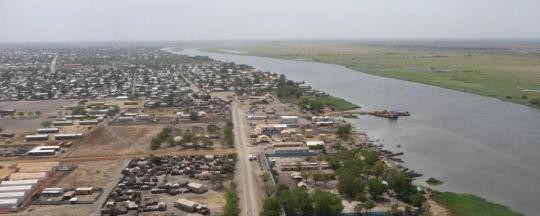Civil servants displaced from the devastated capital of Upper Nile State to South Sudan’s national capital Juba have protested a directive to return to the state and demanded unpaid wages.
This comes after the governor of the oil-producing state Simon Kun Puoc issued a directive instructing all civil servants who were driven by the conflict to report to their respective workplaces in the state in order to receive their May salary, claiming the security situation in Upper Nile is calm and stable.
Reacting to the decision by the governor, the Upper Nile state government employees who came to the capital Juba organized protests against the decision at the Upper Nile State Coordination Office in Juba on Monday.
In interviews with Radio Tamazuj yesterday, several protesting employees decried the decision by the top state official describing it as a humiliation to them.
The protesters noted the majority of the state workforce have gone unpaid for almost four months up till now, saying the government apparently turned a blind eye to the issue of arrears.
The angry employees further revealed that they had a meeting with the state adviser Chol Nyawella on the matter, which they said concluded without any positive response so far.
Kimo Wan, one of the protesting employees, stressed that they do not want to return back to Malakal town, owing to alleged insecurity around the town. He urged the government to pay them in Juba until the security situation improves in the state.
“You know, many civil servants were killed when the second fighting erupted in Malakal town, shortly after the government called back all the employees to the area,” he explained.
Meanwhile, Simon Monyluak cited the immense suffering of civil servants since January. He said, “We often come to the coordination office in Juba on foot just to ask the officials in charge whether the salary is out or not yet.”
Monyluak also echoed that most of the employees that came to Juba were escaping violence, appealing to the state government to wait for a while to return to Malakal until the rainy season ends.
“I still hear about atrocities being committed and violations of cessation of hostilities agreement in Upper Nile. Based on all these things how can I go there?” he asked.
“In addition to that all the local residents lost everything in Malakal town and were left empty-handed. Therefore, I think it would be difficult for us to return back, because our houses were torched and ransacked during the conflict,” the employee said.
Along Acuil, a teacher, pointed out that the government denied them their rights for several months, while the civil servants in other states receive their salaries regularly. He described the state government’s policy toward its employees as “humiliating.”
For his part, the coordinator of Upper Nile office in Juba refused to talk to Radio Tamazuj when asked to comment on the protests staged by the employees at the office.
File photo: Malakal
For breaking news updates from Radio Tamazuj ‘like’ our page on Facebook, follow us on Twitter, or subscribe to our RSS feed.




